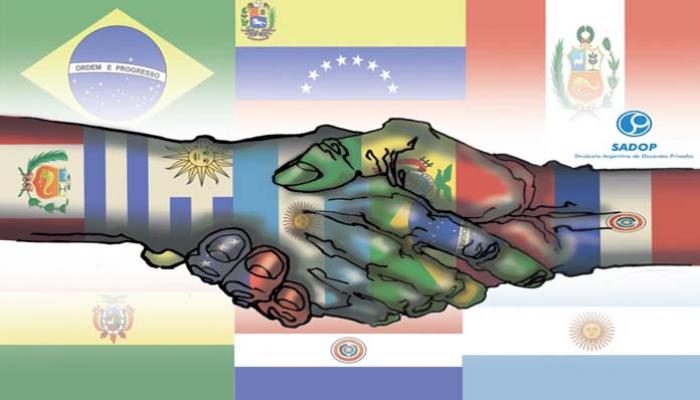South American countries recently have been conducting intense diplomatic activity confirming the will to advance towards fluid and friendly links between the nations in the area. These endeavours in their entirety are steps toward the dream of integration and consolidation as an area of peace and progress.
In her first visit abroad after assuming power in March, the President of Chile, Michelle Bachelet, paid a visit to her Argentinean counterpart, Cristina Fernandez. The leaders agreed to give renewed attention to bilateral social, economic and cultural ties as reflected in the Maipu Treaty, signed by both leaders in 2009. The main purpose of Maipu was to restore a railway connection between both countries, across the Andes mountain range, and a tunnel that goes through it at ground level.[1] The project intends also to open 6 more crossings at other points of the Andes.[1]
Realization of the treaty would give a powerful impetus to bilateral trade and the links of both, Argentina and Chile with other areas of the world such as Asia and Africa. Resumption of the project and its successful completion would also send a clear signal to the international community that Latin America is continuing to overcome its differences.
Both Presidents agreed that each country acting alone cannot advance fast enough in social and economic development. “We need each other to boost our possibilities”, declared the Argentinean President in statements to the world press.
In South America, other countries have already advanced on that promising road. They are Ecuador, Colombia and Peru, who have left behind difficulties, and even armed conflicts in a not so distant past. Those three South American nations now have secure, peaceful common borders.
In Quito, their Ministers of Defense recently agreed on the need to hold regular meetings to exchange information, coordinate actions against the illegal drug trade and other illicit activities, such as arms shipments, and all other attempts against the security of common land, sea and air borders.
All these promising moves must be seen against the inestimable contribution of the Late Hugo Chavez to the process of South American integration.
Chavez reclaimed centuries of resource exploitation at the hands of first world economies. He redirected oil revenue towards the disenfranchised. Venezuela used oil revenues to fund $82bn in grants and subsidies to over 40 countries from 2005 to 2012. In other words, Venezuela has redistributed the equivalent of the Marshall Plan that rebuilt Europe following WWII.
Chavez’s world vision reflected that of his hero, the Latin American independence revolutionary, Simón Bolívar. Bolívar’s dream was to unite the countries of Latin America into a single political entity, capable of resisting the colonial powers of the day. Chavez combined this dream with an alternative to the market system of international trade.
Chavez said, “we do not believe in free trade. We believe in fair trade and exchange, not competition but cooperation.”
In 2005, he founded the Bolivarian Alternative for the Americas (ALBA), a solidarity based trade alliance. The agreement was partly a reaction to a failed attempt by the US to establish a free trade zone extending from Alaska to Cape Horn. In the ALBA alternative, goods and services are traded based on direct need, rather than the self-regulating dynamics of supply and demand. The system works through petro-barter; Venezuela sends oil and receives doctors from Cuba. Chavez said. “We send oil to Uruguay for their refinery and they are paying us with cows…That’s right. Milk for oil. The Argentineans also pay us with cows. And they give us medical equipment to combat cancer. It’s a transfer of technology. We also exchange oil for software technology.”
Western economist have begun to realize that Chavez’s assistance packages, came in the form of zero interest unconditional loans, and provided governments with far more latitude in domestic spending than is the case with any form of Western aid. This domestic freedom produced close international ties. And what we are seeing today in South America is but part of this intelligent legacy.


